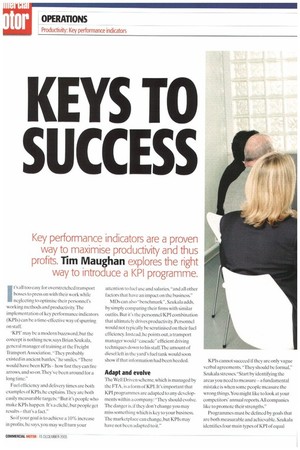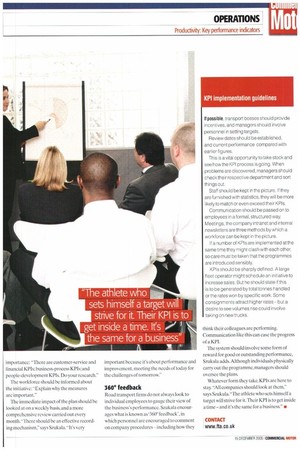KEYS TO SUCCESS
Page 64

Page 65

If you've noticed an error in this article please click here to report it so we can fix it.
Key performance indicators are a proven way to maximise productivity and thus
profits. Tim Maughan explores the right
way to introduce a KPI programme.
It's all too easy for overstretched transport bosses to press on with their work while neglecting to optimise their personnel's working methods and productivity. The implementation of key performance indicators (KPIs) can be a time-effective way of spurring on staff.
• KPI' may be a modern buzzword, but the concept is nothing new, says Brian Szukala, general manager of training at the Freight Transport Association. "They probably existed in ancient battles," he smiles. "There would have been KPIs -how fast they can fire arrows. and so on.They've been around for a long time."
Fuel efficiency and delivery times are both examples of KPIs. he explains. They are both easily measurable targets: "But it's people who make KPls happen. It's a cliche, but people get resultsthat's a fact."
So if your goal is to achieve a 10% increase in profits, he says, you may well turn your
attention to fuel use and salaries, "and all other factors that have an impact on the business."
MDs can also "benchmark", Szukala adds, by simply comparing their firms with similar outfits. But it's the personnel/KPI combination that ultimately drives productivity. Personnel would not typically he scrutinised on their fuel efficiency. Instead, he points out, a transport manager would "cascade" efficient driving techniques down to his staff.The amount of diesel left in the yard's fuel tank would soon show if that information had been heeded.
Adapt and evolve
The Well Driven scheme,which is managed by the FTA, is a form of KPI. It's important that KPI programmes are adapted to any developments within a company: "They should evolve. The danger is, if they don't change you may miss something which is key to your business The marketplace can change, but KPIs may have not been adapted to it."
KPIs cannot succeed if they are only vague verbal agreements. "They should be formal,Szukala stresses. "Start by identifying the areas you need to measure -a fundamental mistake is when some people measure the wrong things.You might like to look at your competitors annual reports. All companies like to promote their strengths."
Programmes must be defined by goals that are both measurable and achievable. Szukala identifies four main types of KPI of equal
importance: "There are customer-service and financial KPIs; business-process KPIs; and people-development KPIs. Do your research."
The workforce should be informed about he initiative: ''Explain why the measures are important."
The immediate impact of the plan should he looked at on a weekly basis, and a more comprehensive review carried out every month. 'There should be an effective recording mechanism," says Szukala."It's very important because it's about performance and improvement, meeting the needs of today for the challenges of tomorrow."
3600 feedback Road transport firms do not always look to individual employees to gauge their view of the business's performance. Szukala encourages what is known as `3600 feedback', in which personnel are encouraged to comment on company procedures including how they think their colleagues are performing.
Communication like this can ease the progress of a KPI.
The system should involve some form of reward for good or outstanding performance, Szukala adds. Although individuals physically carry out the programme, managers should oversee the plans.
Whatever form they take, KPIs are here to stay. -All companies should look at them," says Szukula."The athlete who sets himself a target will strive for it. Their KPI is to get inside a time and it's the same for a business." •
CONTACT www.fla.co.uk






















































































































































































